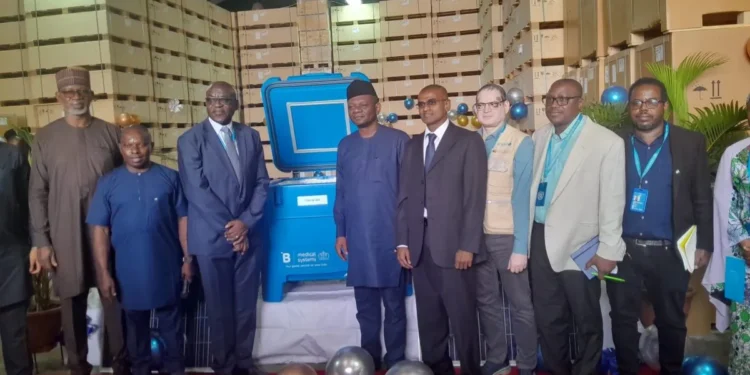The Federal Government of Nigeria has launched a groundbreaking initiative aimed at boosting its national immunization program by distributing 1,653 solar cold chain units nationwide. This initiative, which is valued at approximately $11 million, represents a key advancement in ensuring the stability and effectiveness of vaccines, while also enhancing healthcare access for vulnerable populations, particularly in rural and underserved areas.
The strategic allocation of these solar cold chain units prioritizes underserved regions, with the largest concentrations being directed towards the Northwest and Northcentral zones. These areas are characterized by significant logistical challenges, which include difficult terrain and limited infrastructure, which often impede vaccine delivery and storage. By deploying solar cold chain units, the government aims to create dependable refrigeration solutions that can maintain the required temperatures for vaccines, even in locations with an unpredictable power supply.
Dr. Muyi Aina, the Executive Director of the National Primary Health Care Development Agency (NPHCDA), highlighted the project as a central pillar of President Bola Tinubu’s Renewed Hope Agenda. The goal, he explained, is to deliver high-quality primary healthcare services to all Nigerians, with a strong emphasis on achieving universal immunization coverage. The new solar cold chain units are designed to address a fundamental challenge in vaccine delivery and maintaining a stable temperature from the point of storage to administration.
The distribution plan is meticulously structured to address regional needs:
- Northwest: 448 units
- Northcentral: 308 units
- Southwest: 343 units
- South-South: 221 units
- Southeast: 205 units
- Northeast: 128 units
This allocation strategy ensures that while every state and the Federal Capital Territory (FCT) will benefit, regions with a greater population and more complex logistical networks receive a proportionally higher share of the equipment. According to Dr. Aina, 884 units, representing 53% of the total, are designated for Northern Nigeria, with the remaining 759 units (47%) going to states in the South.
The procurement and delivery of the cold chain units were made possible through a robust partnership with several international organizations, including Gavi, the Vaccine Alliance, UNICEF, and the World Health Organization (WHO). This collaboration underscores a global commitment to strengthening Nigeria’s public health infrastructure.
Speaking at the official handover ceremony, Dr. Maharajan Muthu, UNICEF’s Chief of Health, emphasized that a reliable cold chain is the “backbone of an effective immunization programme.” He noted that the new infrastructure will ensure that vaccines and other temperature-sensitive medical supplies retain their potency from the central warehouses to the final point of care, even in remote areas that lack consistent electricity.
Dr. Muthu also detailed UNICEF’s role, which included providing comprehensive technical support in needs analysis, procurement, and the delivery of state-of-the-art equipment. The $11 million investment covers not only the 1,653 solar refrigerators but also 165 sets of spare parts, temperature monitoring devices, and 30-day temperature recorders, all designed to ensure the durability and reliability of the system.
A representative from the WHO, Dr. Alex Chimbaru, reinforced the significance of the initiative by linking it to broader international health objectives, specifically the Immunization Agenda 2030. This global framework advocates for equitable access to vaccines and the establishment of sustainable, resilient health systems. By leveraging solar technology, Nigeria is not only protecting public health but also advancing environmental sustainability.
Dr. Chimbaru highlighted that these refrigerators will play a “pivotal role in maintaining vaccine quality and safety,” especially in communities that are off the power grid. He concluded by expressing appreciation for the collective efforts of the Nigerian government, Gavi, UNICEF, and other partners, whose collaboration is critical to increasing immunization coverage and ensuring every child receives life-saving vaccines.
While this delivery represents a major victory, partners acknowledge that ongoing challenges remain, including asset tracking, routine maintenance, and securing long-term funding. Both UNICEF and WHO have pledged to continue their support to the Nigerian government in overcoming these obstacles to ensure the program’s long term success.



